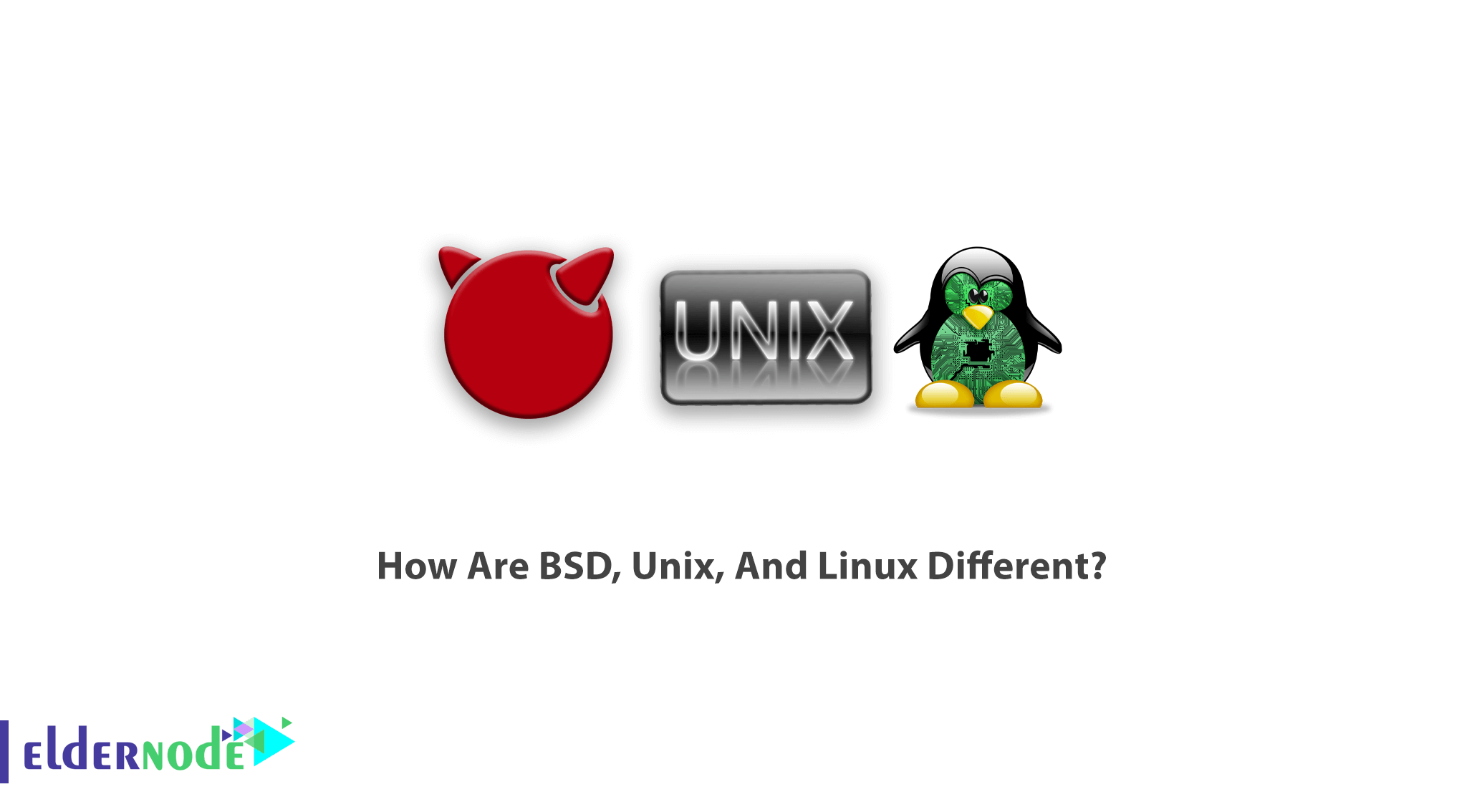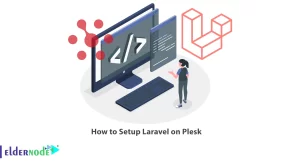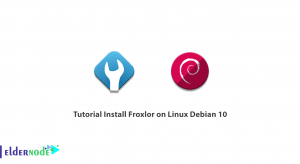
You may have heard and seen the names of Unix, Linux, and BSD together. It seems they could be similar to each other but there are some differences between them. While Linux is a kernel, not an OS, BSD is a ‘Unix-like’ complete OS, with its own kernel and userland. In this article, you will learn How Are BSD, Unix, And Linux Different. Choose your favorite package of Linux Virtual Private Server on Eldernode and purchase your own VPS Hosting.
Table of Contents
Difference Between BSD, Unix, And Linux
Linux and its family are representative of the open-source community. Berkeley Software Distribution (BSD) may be lesser-known but is one of the major names in the open-source community. Before reviewing the differences, let’s have a brief look at the history and features of BSD, Unix, and Linux.
What is BSD?
The Berkeley Standard Distribution is the implementation of UNIX developed at the University of California, Berkeley Also known as free, open-source, and BSDI, it includes source code from the original System V in its kernel. Berkeley’s Unix was the first Unix to include libraries supporting the Internet Protocol stacks: Berkeley sockets.
A Unix implementation of IP’s predecessor, the ARPAnet’s NCP, with FTP and Telnet clients, had been produced at the University of Illinois in 1975 and was available at Berkeley. However, the memory scarcity on the PDP-11 forced complicated design and performance problems. Some of the operating systems that are based on BSD are FreeBSD, OpenBSD, NetBSD, MidnightBSD, GhostBSD, Darwin, and DragonFly BSD.
Reasons for Public Reluctance to BSD
What is Linux?
Linux is an operating system. Like most Unix-like OSes, Linux is made up of several components. An operating system is a software that manages all of the hardware resources associated with your desktop or laptop. To put it simply, the operating system manages the communication between your software and your hardware. While Linux is similar to other operating systems such as Windows, macOS (formerly OS X), or iOS, But from point of the important ways is different. Except for being open-source software, the code using to create Linux is free and available to the public to view, edit, and—for users with the appropriate skills—to contribute to.
Here are some better Linux distributions:
1- Ubuntu
2- SuSE
What is Unix?
Unix is also an operating system and supports multitasking and multi-user functionality. Unix systems are characterized by a modular design that is sometimes called the “Unix philosophy”. According to this philosophy, the operating system should provide a set of simple tools, each of which performs a limited, well-defined function. You can find Unix being used widely in all forms of computing systems such as desktop, laptop, and servers. On Unix, there is a Graphical user interface similar to windows that support easy navigation and a supportive environment.
How Are BSD, Unix, And Linux Different?
At this point, you got familiar with BSD, Unix, and Linux. Stay with us to study the differences between them. Firstly we begin with the comparison Of Unix And Linux.
Unix VS Linux
Unix operating system is very old and can be considered as the father of other operating systems. The operating philosophy of this operating system was to work with a large number of computers. Due to the difficulty of working with this type of operating system, usually, the number of people who have acceptable control over it is very small and you have to pay a high price to use it. Linux, on the other hand, was created by a person named Linus Torvalds, and unlike Unix, it is completely free to use, and learning to work with it is much easier than Unix.
In the Unix operating system, the user interface has been sacrificed for heavy processing power, which is why Unix user interfaces are so difficult. The Unix operating system is designed for the server, while the Linux operating system is designed for both the server and the client, so they have both a GUI and a shell command-line interface. In the Linux operating system, to increase the processing power, the graphical environment or GUI can be converted to a shell environment.
You have to pay to use the Unix operating system if using the Linux operating system is completely free and you do not need to pay to use it.
Linux is an open-source operating system, and unlike Unix, it is a kind of Closed Source and it is not possible to change its core. The main differences between these two types of operating systems can be summarized as follows: Unix is an old operating system and Linux is somehow derived from this operating system. Unix does not have a graphical interface, but Linux has a graphical interface. Using Unix is free of charge if using Linux is free.
Linux VS BSD
At this point, we are going to check the top 10 differences between Linux and BSD:
1- License
Linux is released under the GPL and the license used by BSD is BSD License. The main difference between the two operating systems at the license level is that the GPL license guarantees that the software here is Linux to remain free forever and that anyone who uses or modifies it in the same way and with the same license without Close some of the code to redistribute it to the next person.
In general, the GPL guarantees that the software will remain free forever.
On the other hand, the SDBSD license does not have strict rules in the form of GPL in keeping the software free, and the person who uses the source of this software and changes it does not have to redistribute it or publish it with the same license, and even has the license to use the software. Give the software a closed source with the next person.
2- Project Control
How to manage project control in Linux is that the final decisions are made by one person, Linus Torvalds, who I have already described how to develop and manage the Linux kernel. But the way BSD is developed is unlike Linux. In the BSD project, the final decisions are made by a management board and no particular person applies their personal opinion to the project.
3- Operating System Integrity
Linux is just a kernel and the core of the operating system, and really joining the GNU project and several other tools outside of these two projects will form an operating system and be distributed in the form of distros such as Debian, Fedora, Ubuntu. etc. On the other hand, BSD, in addition to having its own core and kernel, also has its own application tools, which all together create an integrated operating system, the product of a single project. There is a tool from the GNU project in BSD that is used, but the lack of that tool does not cause a lack of completeness in the operating system.
4- Being quasi-Unix
Unix, as always, has been a feature of Linux and BSD operating systems. In the 1990s, the two projects were inspired by the Unix OS, and both aimed to create a Unix-like OS. For 20 years, Linux tried to be a more modern operating system and It moved a little away from the basics of Unix, and that was the key to its success among other operating systems. But on the other hand, BSD tried to keep itself more like Unix, and it succeeded in this, and so far the most quasi-Unix operating system can be called the same BSD.
5- The Basis of the System
The fifth case may be a little difficult to understand, but it is somewhat related to the third case. When it comes to the Base System, the first thing that comes to mind is the core of the OS. Because Linux consists of two projects, the Linux kernel, and the GNU project, it can be said that the Base System is the Linux kernel, which the kernel itself does not have for the use and must be placed next to other tools. But in BSD this is a little different. When it comes to the basics of the operating system, it is the BSD kernel and kernel that sit next to some other tools and creates the Base System, which if the system does not provide us with an application, but can at least be used in practice.
6- Being Source-Based
This is understandable for Arch Linux and Gentoo users deal with it on a daily basis. One of the strengths of BSD is its reliance on Port Collection. If I want to give an equivalent in Linux, I have to refer to the ABS system in Arch Linux and Portage in Gentoo, which has implemented exactly the same system. Using the port, you will be able to compile and install software٫ libraries from the source without any hassle of finding prerequisites with just one command. Unlike BSD in Linux, packages are downloaded and installed from software repositories of the same distribution, and in fact, software binary packages have already been created by other people for the convenience of the user. It goes without saying that BSD also uses binary packages.
7- System Upgrade
One of the advantages of Linux is that it always uses a Built-in package manager. Like apt in Ubuntu and Debian or yum in Fedora and Red Hat or Pacman in Arch Linux or…. Packages are managed and updated by the package manager and system upgrade operations are performed seamlessly. Such a feature can be found in BSD, but not to the power of the Linux package manager. If the user wants to use Port Collection to install packages, it may be a bit difficult to upgrade.
8- System Stability
The BSD family can be classified as the most stable operating system in the IT world. SDBSD users may have encountered the phrase “If it isn’t broken, don’t fix it,”! If something is not damaging, do not touch it! This is a famous sentence that recounts the strength and stability of BSD. Perhaps this sentence can be interpreting in such a way that nothing goes wrong that you want to fix. On the other hand, Linux is not like this.
You may have to reinstall the system without having to do anything by changing another part of the os. (Like some distributions based on unstable other distribution repositories. Of course for novice and regular users. However, it is a reality that any curious user encounters with the operating system.
9- Hardware Support
One of the problems with BSD is the lack of timely support for hardware and technologies along with other OSs. If you bought a laptop with the latest hardware, you should not expect BSD to work well with it. That’s why you can’t see BSD like Linux on desktop systems and regular users. But on the other hand, in Linux, this is a little different. Support for new hardware technologies may happen sooner on Linux before it even works on Windows.
10- User Friendly
Perhaps the last case can be considered as a summary of the previous 9 cases, and that is its user-friendliness. Reviewing the previous 9 cases, you’ll find that BSD may not be very suitable for the average user and desktop. Although there are those who are austere and willing to learn new things, use BSD for the desktop as well. However, you will find that Linux can be far more user-friendly than BSD, although there is still room for improvement for Linux to have an ideal desktop.
Conclusion
In this article, you learned about BSD, Unix, And Linux, and the difference between them. Since there is a large number of people who support Linux over BSD, Linux is more visible on the machines. The history of each one and the differences between these three have been explained in detail. However, it is hard to point one of the three as the best because all of them have their own set of pros and cons and of course fans.





What are the best alternatives for a Genuine Unix?
In case you need some alternatives, I can introduce you the BSD Implementation, MINIX 3 and OpenIndiana
Which one are freeware please?
The Unix is not freeware. The source code of UNIX is not available free for users. But the Linux and the BSD are freeware and the source code of Linux is freely available to all users.
Very good. What about being portable?
UNIX is a non-portable operating system. But the Linux and BSD are portable operating system which can be executed on different hard drives.
What is the difference between the devices we can install them on?
Among these three, Linux is a very flexible operating system which can be installed on most of the home-based PCs and also is used on home-based pcs, desktops, mobile phones, etc. • BSD can also be installed on most of the systems. And • Unix is mainly used in most server systems, High-end computers, and mainframe systems.
What files are they supporting? Thank u.
Unix supports: zfs, js, hfx, gps, xfs, vxfs.
Linux supports: xfs, ramfs, nfs, vfat, cramfsm, ext3, ext4, ext2, ext1, ufs, autofs, devpts, ntfs.
And • BSD supports Unix File System or UFS, which is modernized as UFS2. ZFS is also available for free BSD.
Great article.
I’ve been using FreeBSD since version 5.3 on laptops and desktops, currently including a Thinkpad and an HP Z620 workstation – my main area of work is image editing.
Nothing is perfect, but the decision for FreeBSD was the best decision for me, at least as far as software is concerned. 🙂